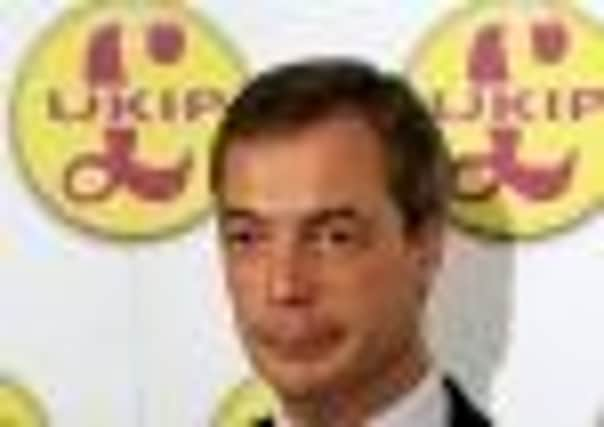Tom Peterkin: UKIP making a serious challenge for seats in Scotland is not as far-fetched as some people might believe


But that is precisely what the UKIP leader Nigel Farage believes. In an interview with Holyrood magazine published yesterday, Farage talked about holding a Scottish conference organising fund-raising dinners and selecting credible business people as candidates for the Euro and Scottish Parliament elections.
In the past, UKIP has barely registered on the Scottish political radar, but, ever the optimist, Farage believes that could be about to change. A cursory look at a poll published yesterday might suggest that he has a point. An Ipsos MORI poll of more than 1,000 Scots shows that a majority back David Cameron’s plans for an in/out referendum on the UK’s membership of the EU.
Advertisement
Hide AdAdvertisement
Hide AdA total of 58 per cent were in favour of an EU referendum, while only 36 per cent thought otherwise.
Recent controversies surrounding the SNP’s position on Europe is something that Farage believes he can capitalise on. Farage takes heart from EC President Jose Manuel Barroso’s intervention that spelled out that an independent Scotland would have to apply for EU membership after splitting from the UK.
As Farage put it: “The real European debate in Scotland has just begun and the floodgates have been opened and the Salmond proposition about an independent Scotland in the EU is, frankly, a logical inconsistency within that.”
The UKIP leader also disputed the conventional wisdom that Scots are simply not Eurosceptic enough to vote for UKIP. “People say that the Scots are all in favour of the EU as if it’s some proven truth but it’s rubbish,” Farage said.
There may be some truth in that, but Farage’s optimism that it would translate into UKIP votes appears a trifle over-egged.
In Scotland, Europe does not arouse the sort of passionate disagreement that has torn the Conservative Party apart. Nor can one imagine UKIP enjoying the sort of success in Scotland that made the rise of Farage’s party (in addition to discontented Tory MPs) a key reason for Cameron pledging an EU referendum. Yesterday’s Ipsos MORI poll showed that 53 per cent of Scots want to stay in Europe while 34 per cent want out. While there may be a sizeable minority of Scots who are dissatisfied with Europe, the realpolitik is that the domestic constitutional question resonates far more strongly than European matters.
Farage himself nailed it when he explained why Scotland had been such a graveyard for UKIP. Until Barroso’s intervention, Farage said that, in the past, the argument for Scottish independence “trumps” any argument about Europe. The problem for UKIP is – whatever Barroso may or may not say – that will remain the case for the foreseeable future.